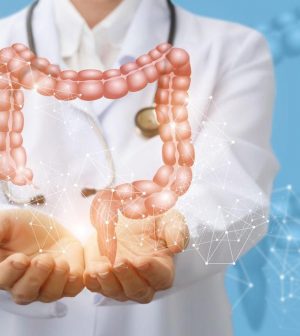- Recognizing the Signs of Hypothyroidism
- 10 Strategies to Overcome Insomnia
- Could Artificial Sweeteners Be Aging the Brain Faster?
- Techniques for Soothing Your Nervous System
- Does the Water in Your House Smell Funny? Here’s Why
- Can a Daily Dose of Apple Cider Vinegar Actually Aid Weight Loss?
- 6 Health Beverages That Can Actually Spike Your Blood Sugar
- Treatment Options for Social Anxiety Disorder
- Understanding the Connection Between Anxiety and Depression
- How Daily Prunes Can Influence Cholesterol and Inflammation
Too Many Antibiotics Might Raise Colon Cancer Risk

Here’s another reason to avoid unnecessary use of antibiotics: Long-term use of these medications could increase your risk of colon cancer, researchers say.
“While in many cases antibiotic therapy is necessary and saves lives, in the event of less serious ailments that can be expected to heal anyway, caution should be exercised. Above all to prevent bacteria from developing resistance but, as this study shows, also because antibiotics may increase the risk of future colon cancer,” said study author Sophia Harlid, a cancer researcher from Umeå University in Sweden.
However, there’s no reason to panic, she added.
“There is absolutely no cause for alarm simply because you have taken antibiotics. The increase in risk is moderate and the effect on the absolute risk to the individual is fairly small,” Harlid explained in a university news release.
This link to colon cancer might be due to the impact that antibiotics have on the intestinal microbiome, or gut bacteria, according to the study.
The researchers analyzed data on 40,000 patients in the Swedish Colorectal Cancer Registry, and compared them with a control group of 200,000 cancer-free people in Sweden’s general population.
Investigators also examined antibiotic use data in Swedish Prescribed Drug Register.
They found that both women and men who took antibiotics for over six months had a 17% higher risk of developing cancer in the ascending colon — the first part of the colon to be reached by food after the small intestine — than those who didn’t take antibiotics.
The increased risk of colon cancer was already evident five to 10 years after taking antibiotics. Even though those who took the most antibiotics had the greatest increase in risk, there was a small but statistically significant increase in the risk of colon cancer after a single course of antibiotics, according to the study.
There was no link between antibiotics and an increased risk of cancer in the descending colon or an increased risk of rectal cancer in men. Women taking antibiotics had a slightly reduced risk of rectal cancer, according to the researchers.
The study, published Sept. 1 in the Journal of the National Cancer Institute, confirms the results of an earlier smaller British study.
More information
The U.S. National Cancer Institute has more on colon cancer.
SOURCE: Umeå University, news release, Aug. 30, 2021
Source: HealthDay
Copyright © 2026 HealthDay. All rights reserved.










